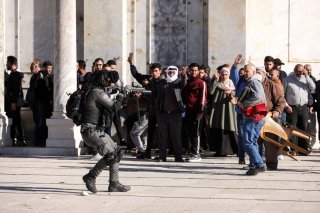Israeli Police Raid of Al-Aqsa Mosque Raises Fears of Wider Violence
Videos of the raid showed clashes between police and rock-throwing protesters.
At least ninety Palestinian civilians were injured on Friday after a pre-dawn raid by Israeli police on the Al-Aqsa Mosque in East Jerusalem descended into violence.
The Waqf (Islamic charitable endowment) that runs the Al-Aqsa Mosque, one of the holiest buildings in Islam, announced in a statement that Israeli police had entered the building early on Friday morning as congregants gathered for pre-dawn prayers. Videos of the raid circulated widely on social media, showing clashes between police and rock-throwing protesters and depicting tear gas and stun grenade explosions. The Palestinian Red Crescent later claimed that it had helped to transport injured Palestinians to hospitals in the area, although it accused Israeli security forces of attempting to prevent ambulances and paramedics from evacuating the wounded from the scene.
The Israel Police defended its actions at the mosque in a statement, noting that officers had entered the mosque grounds to break up the crowd after a group of Palestinians within began throwing rocks at Jewish worshippers near the neighboring Western Wall. It also reported that three of its officers had been injured in the violence.
Tensions between Israelis and Palestinians in Jerusalem have remained perpetually volatile in recent years, but they have noticeably increased throughout the spring of 2022. In response to a series of terrorist attacks by Palestinians inside Israel, Israeli security forces have launched raids into Palestinian areas of the Israeli-occupied West Bank. At least fourteen Israeli civilians have been killed in the ongoing violence, as have at least sixteen Palestinians.
In 2022, the Islamic holy month of Ramadan, the Jewish holiday of Passover, and the Christian holiday of Easter all occur within the same week, leading tens of thousands of pilgrims from all faiths to visit Jerusalem and raising tempers between the three groups.
The Al-Aqsa Mosque, which is governed by a Waqf from neighboring Jordan but lies within the Israel-controlled Old City of Jerusalem, has been a flashpoint for violence for three decades. In 2000, future Israeli Prime Minister Ariel Sharon’s decision to visit the Temple Mount led thousands of Palestinian protesters to congregate around the mosque. Israeli police attempted to disperse the protesters, and the violence that followed is credited with starting the “Second Intifada,” a five-year campaign of violence that decreased after Israel withdrew from the Gaza Strip and constructed a separation barrier between Israel and the West Bank.
Further violence at the mosque in 2021 led Hamas, the militia-cum-political party classified as a terror group by the United States, to launch a series of rockets into Israel from the Gaza Strip last spring, leading to an eleven-day war. Several hundred Palestinians were killed during that conflict, as were twelve Israeli civilians and one soldier.
Trevor Filseth is a current and foreign affairs writer for the National Interest.
Image: Reuters.

